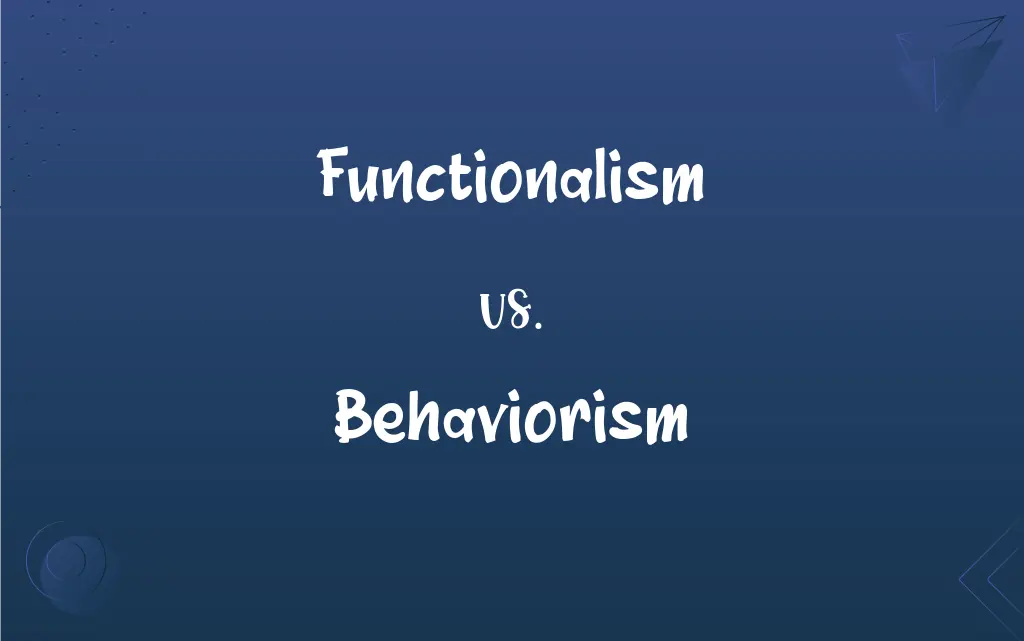Functionalism vs. Behaviorism: What's the Difference?
Edited by Aimie Carlson || By Janet White || Published on January 25, 2024
Functionalism focuses on the purpose and function of consciousness and behavior. Behaviorism emphasizes the study of observable behaviors and external stimuli.

Key Differences
Functionalism explores mental processes and consciousness, seeking to understand how the mind works and why it operates as it does. Behaviorism, in contrast, rejects the examination of internal mental states and focuses solely on observable behaviors.
Functionalism considers the internal processes, like emotions and thoughts, that guide behavior. Behaviorism posits that all behaviors are learned through interaction with the environment and are reinforced by consequences.
Functionalism emerged as a reaction to structuralism, emphasizing the evolutionary purpose of psychological characteristics. It considers mental life and behavior in terms of active adaptation to the person's environment. Behaviorism strictly adheres to the scientific method, requiring objective, quantifiable evidence for hypotheses. This approach led to controlled experiments and behavioral modification techniques.
Functionalism integrates a broader range of mental experiences, including emotional and subjective states, considering them essential for understanding behavior. Behaviorism, spearheaded by figures like John B. Watson and B.F. Skinner, revolutionized psychology by introducing a more empirical approach, focusing on conditioning and behavior reinforcement.
Comparison Chart
Focus
Mental processes, consciousness
Observable behavior, external stimuli
ADVERTISEMENT
View on Internal States
Integral for understanding behavior
Largely ignored or deemed irrelevant
Methodology
Broader, introspective
Empirical, experimental
Key Figures
William James, John Dewey
John B. Watson, B.F. Skinner
Historical Context
Reaction to structuralism
Emphasis on empirical, scientific study
Functionalism and Behaviorism Definitions
Functionalism
A psychological approach focusing on the function of consciousness.
Functionalism analyzes how mental processes help individuals adapt to their environment.
ADVERTISEMENT
Behaviorism
The school of thought that disregards internal mental states for behavior analysis.
Behaviorism attributes phobias to learned associations, not to internal fears.
Functionalism
The study of mental processes from the standpoint of their evolutionary usefulness.
Functionalism explores why fear evolved as a protective mechanism.
Behaviorism
A psychological perspective that deals with how behaviors are acquired and modified.
Behaviorism uses conditioning techniques to modify aggressive behaviors.
Functionalism
A perspective that emphasizes the utility of consciousness in problem-solving.
Functionalism views dreaming as a way to process information and solve problems.
Behaviorism
An approach that emphasizes environmental factors in shaping behavior.
Behaviorism explores how rewards and punishments condition behavior.
Functionalism
A doctrine stressing the importance of understanding the purpose of behavior.
Functionalism examines the role of emotions in guiding decision-making processes.
Behaviorism
A doctrine in psychology that considers behavior as a response to stimuli.
Behaviorism explains learning as a process of responding to external stimuli.
Functionalism
A theory in psychology that considers mental life and behavior in terms of active adaptation.
In functionalism, each behavior is seen as serving a purpose.
Behaviorism
A theory in psychology focused on observable and measurable behaviors.
Behaviorism studies the impact of reinforcement on learning.
Functionalism
The doctrine that the function of an object should determine its design and materials.
Behaviorism
A school of psychology that studies observable and quantifiable aspects of behavior and excludes the study of subjective phenomena, such as emotions or motives.
Functionalism
A doctrine stressing purpose, practicality, and utility.
Behaviorism
An approach to psychology focusing on observable behavior which, generally assuming that behavior is determined by the environment and denying any independent significance for mind, largely ignores any pathophysiological processes which may, or may not, underlie subjective, behavioral phenomena.
''Behaviorism is considered by most philosophers of medicine, to be an expression of the weaker, minimalist interpretation of the 'medical model' of clinical psychology because it focuses the study and classification of mental disorders upon a phenomenological, rather than a pathophysiological, approach to the subject.
Functionalism
(Philosophy) The doctrine in the philosophy of mind according to which mental states are defined by their causes and effects.
Behaviorism
An approach to psychology that emphasizes observable measurable behavior.
Functionalism
(architecture) A doctrine, in several fields, that the function of something should be reflected in its design and the materials used in its construction.
Behaviorism
An approach to psychology that emphasizes observable measurable behavior
Functionalism
(philosophy) The definition of mental states in terms of their causes and effects.
Functionalism
(social science) The idea that social and cultural cohesion are a function of the interdependence and interactions of the institutions of a society.
Functionalism
(psychology) A general school of thought that considers psychological phenomena in terms of their role in adaptation to the person's environment.
Functionalism
(linguistics) functional linguistics
Functionalism
A psychology based on the assumption that all mental process are useful to an organism in adapting to the environment.
Functionalism
Any doctrine that stresses utility or purpose.
Functionalism
A psychology based on the assumption that all mental process are useful to an organism in adapting to the environment
Functionalism
Any doctrine that stresses utility or purpose
FAQs
What is behaviorism?
Behaviorism is a psychological approach emphasizing the study and modification of observable behaviors and their external causes.
How do functionalism and behaviorism differ in their approach to psychology?
Functionalism considers internal mental processes essential for understanding behavior, while behaviorism focuses solely on observable behaviors and external stimuli.
What is functionalism?
Functionalism is a psychological theory focusing on the function of consciousness and mental processes in adapting to the environment.
Who are key figures in behaviorism?
John B. Watson and B.F. Skinner are major figures in the development of behaviorism.
Does functionalism consider the evolutionary aspect of mental processes?
Yes, functionalism often looks at mental processes from an evolutionary perspective, considering their adaptive value.
How does functionalism address mental disorders?
Functionalism would analyze mental disorders in terms of dysfunctional mental processes or maladaptive behaviors.
What is a key contribution of functionalism to psychology?
Functionalism expanded the scope of psychology to include a wider range of mental experiences.
How has behaviorism influenced modern psychology?
Behaviorism has significantly influenced the development of behavioral therapies and educational techniques.
What role does the environment play in behaviorism?
In behaviorism, the environment is crucial as it provides stimuli that shape and modify behaviors.
Who are key figures in functionalism?
William James and John Dewey are notable proponents of functionalism.
Is behaviorism limited to human behavior?
No, behaviorism also studies animal behavior, often through controlled experiments.
Can functionalism explain changes in societal behavior?
Functionalism can be used to analyze how societal changes impact collective mental processes and behaviors.
Did functionalism influence educational practices?
Yes, functionalism influenced educational methods by emphasizing the application of knowledge and adaptive thinking.
Is behaviorism still a dominant theory in psychology?
While influential, behaviorism has been supplemented by other theories that also consider internal mental states.
How does functionalism view emotions?
Functionalism views emotions as integral to understanding human behavior and decision-making.
Does behaviorism support the use of introspection?
No, behaviorism generally rejects introspection as it is not observable or measurable.
What is a major criticism of behaviorism?
A major criticism is its neglect of internal mental states, which many believe are essential for a complete understanding of behavior.
Can functionalism and behaviorism be integrated?
While fundamentally different, some contemporary approaches in psychology attempt to integrate aspects of both.
Does functionalism consider subjective experiences?
Yes, functionalism values subjective experiences as part of understanding the mind.
How did behaviorism impact animal training?
Behaviorism's principles, like conditioning, have been extensively applied in animal training.
About Author
Written by
Janet WhiteJanet White has been an esteemed writer and blogger for Difference Wiki. Holding a Master's degree in Science and Medical Journalism from the prestigious Boston University, she has consistently demonstrated her expertise and passion for her field. When she's not immersed in her work, Janet relishes her time exercising, delving into a good book, and cherishing moments with friends and family.
Edited by
Aimie CarlsonAimie Carlson, holding a master's degree in English literature, is a fervent English language enthusiast. She lends her writing talents to Difference Wiki, a prominent website that specializes in comparisons, offering readers insightful analyses that both captivate and inform.































































